Introduction
PlatinumGames embodies style, imagination, and risk-taking. Spawned in 2007 by Capcom veterans, including Resident Evil creator Shinji Mikami and Devil May Cry and Okami mastermind Hideki Kamiya, the studio became a haven for these minds to create new franchises under the freedom of independence. Early success like MadWorld turned heads, but Platinum’s third title, Bayonetta, cemented it as one of the game industry’s premier action studios.
Launching in Japan in 2009 and hitting U.S. shores in 2010, Bayonetta revamped and, in some ways, improved the stylish action of its spiritual predecessor, Devil May Cry. The bewitching adventure reinvented and reinvigorated the stylish action genre; Platinum created its magnum opus in only two years. Unfortunately, sales didn’t match the reception, and Sega, the game’s original publisher, passed on a sequel. Despite fans’ cries, Bayonetta seemingly ended the series before it could take off.
Nintendo stepped up to answer those pleas by agreeing to publish a follow-up. Bayonetta 2 arrived in 2014 as a Wii U exclusive. The sequel proved Bayonetta wasn’t a one-hit wonder, becoming one of the year’s best games with some fans believing it surpassed its predecessor. The success also proved the family-friendly Nintendo had no problem letting the franchise remain true to its Mature-rated self.
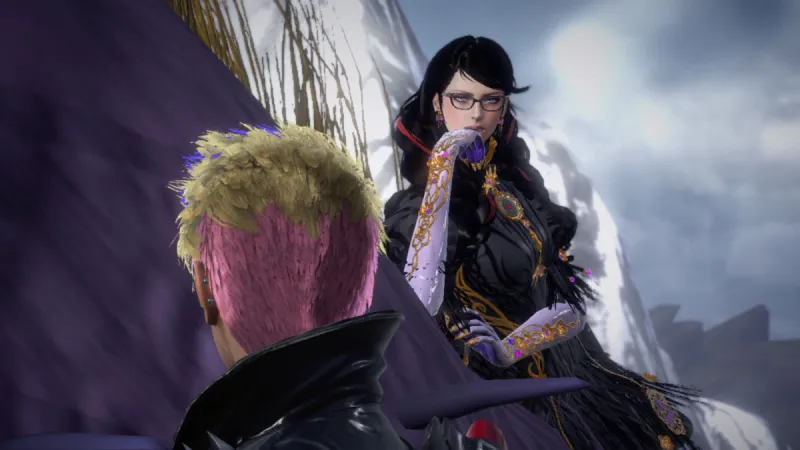
When the Nintendo Switch launched in 2017, it didn’t take long for Platinum to reveal Bayonetta 3 as another Nintendo exclusive. However, the third game vanished from the spotlight shortly after, kicking off four years of infrequent updates and uncertainty about its existence.
That finally changed last September when the game re-debuted with its first gameplay trailer. It unveiled a newly designed Bayonetta, sporting a fresh but familiar hairdo, doing what she does best: kicking the crap out of her enemies with brutal style and grace. Eyebrows raised even higher when Bayonetta conjured her faithful demon Gomorrah to go toe-to-toe with a titanic adversary in a kaiju-sized version of a Rock ʼEm Sock ʼEm Robot fight. Since then, information on Bayonetta 3 has steadily trickled in. A multiverse introducing alternative versions of Bayonetta. A never-before-seen breed of enemies. And a new, foul-mouthed witch at the center of it.
Bayonetta 3 is finally on the horizon and has years of anticipation and legacy to live up to. Platinum enthusiastically embraces this pressure. Instead of resting on the series’ laurels, it brings a number of big ideas to the table (literally, in some cases), creating a monster of a sequel too big for a single dimension.
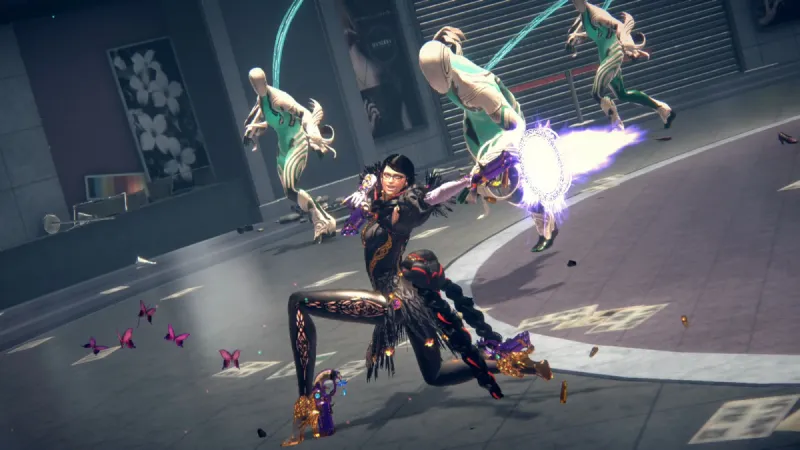
“It seems I’m unfashionably late. But I’m ready to give you everything you want”
The years-long wait has many fans asking two questions: what took so long, and why was Platinum so quiet? I presented these questions to Bayonetta 3’s principal developers: director Yusuke Miyata, producer Yuji Nakao, and supervising director Hideki Kamiya. Platinum’s top brass wouldn’t offer specific reasons for the game’s wait, only saying that it was necessary to create the ultimate Bayonetta experience.
“We put a lot into the previous titles, too, but because this is a sequel, we decided to put in even more content this time,” says Miyata. “As a result, we kept our fans waiting, but it will be worth the wait.”
I’m among the fans that eagerly ate up any morsel of information about the game over the years; I couldn’t wait to finally get my hands on it. Thankfully, a trip to Nintendo of America’s headquarters in Redmond, Washington, granted my wish. I played two demos set during the early hours of Bayonetta 3, which gave me a chance to test drive both the titular witch and newcomer Viola.
Bayo with the New Voice
Narratively, Kamiya states that Bayonetta 3 takes place not too long after the events of the last game. The demo begins immediately after the game’s prologue. As the scene fades in, I’m greeted by the familiar jazzy tune of The Gates of Hell, the underworld bar and weapons shop owned by Rodin, the series’ demonic weapons smith. He’s not alone. Bayonetta, her best friend and sister-in-arms Jeanne, and a weeping Enzo, Bayo’s Joe Pesci-inspired informant, stand present and accounted for. The underground bar shakes and rumbles; something big is going down on the surface and sounds like it’s going to crash through the roof at any moment. Enzo, rocking a baseball cap, t-shirt, and sports jacket instead of his usual suit and hat, cries over a shattered picture of his children, Ed and Edna, implying something terrible may have happened to them. Rodin assures the gang that the bar can withstand whatever onslaught is unfolding up top. After all, Enzo has a tab to pay.
“This place will hold for a little while,” says Rodin. “A very little while.”
Rodin explains the source of the disturbance: The Homunculi, Bayonetta 3’s new class of enemies that hail from neither Paradiso nor Inferno. Rather, these monstrosities are man-made in origin. I don’t get much time to ponder the Homunculi’s origins before Viola, a young Umbra Witch trainee and Bayonetta 3’s second playable protagonist, barges into the room. This punk rock-inspired warrior brandishes a katana and plenty of attitude. Viola greets Bayonetta and Jeanne with familiarity, but the two witches don’t recognize her at all.
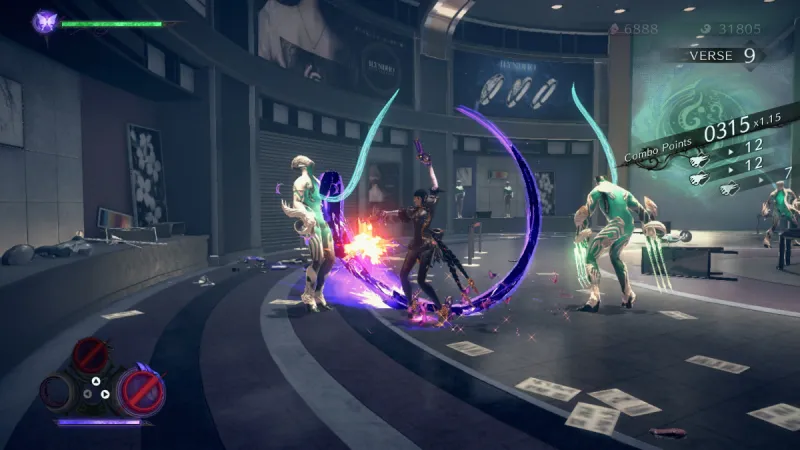
Viola breathlessly attempts to explain the complicated truth: She hails from an alternate reality and is acquainted with our witchy friends in that timeline. The revelation prompts Rodin to explain the concept of the multiverse, which he compares to slices of fine wagyu beef someone is attempting to shove into a meat grinder.
The multiverse has been an element of Bayonetta lore since the first game, but this adventure places it front and center, blowing it out like never before. As seen in trailers, expect to encounter multiple versions of Bayonetta hailing across various timelines. Though Platinum wouldn’t divulge what these variants bring to the table, this premise couldn’t have come at a better time. The multiverse concept has gained mainstream familiarity thanks to Marvel and DC’s cinematic universes, and films such as Everything Everywhere All At Once. Platinum states that while it turned to such works for reference, itʼs ultimately is doing its own spin on the idea.
“I’m actually a huge fan of the MCU movies, and recently I really enjoyed watching the Loki series,” says Kamiya. “I had already finished writing the plot for Bayonetta 3 at the time I started watching Loki, and this series did not have any influence over the Bayonetta 3 story per se … Quite a bit of time has passed since then, and now that the multiverse concept has a solid foundation in entertainment, I feel that it’s easier for people to absorb the concept and enjoy the story of Bayonetta to an even greater degree.”
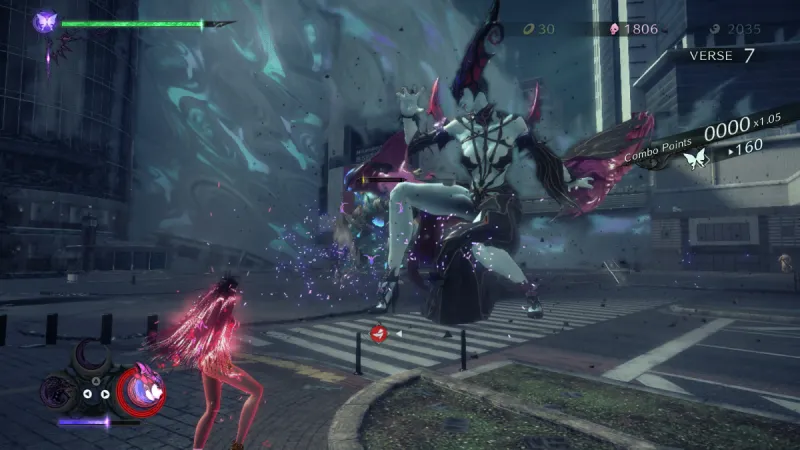
Although Kamiya says players familiar with the series will have an easier grasp of Bayonetta 3’s plot, Platinum is presenting the story and world in a manner that will be newcomer-friendly.
Back at the Gates of Hell, Viola says she’s on a mission to locate a scientist named Dr. Sigurd and a device called a Chaos Gear. Somehow, bringing these elements together will be vital to preventing the multiverseʼs collapse. At this moment, I’m introduced to Viola’s demonic companion, Cheshire. This cartoonish oversized cat chills by the bar, resembling an anime version of the mischievous critter made famous in Alice in Wonderland. As Viola beckons it, Cheshire stretches its large multi-colored maw and coughs up a vintage penny-farthing bicycle, of all things. Cheshire hops atop the old-timey bike, and Bayonetta and Viola sit on Cheshire’s ample noggin as the demon whisks them through a portal to begin their quest.
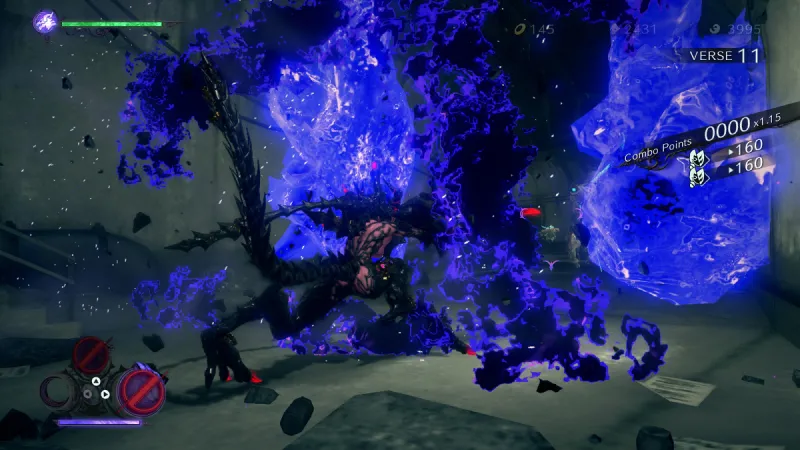
A Demonic Influence
A Demonic Influence
Bayonetta and Viola arrive in Thule, an island serving as a junction point used for traveling between multiverses. Players will have to wait to learn how this mysterious location operates, but a welcoming party of Homunculi greets me moments after my arrival. These green-tinted enemies are man-made lifeforms made up of numerous living bodies. As such, they can reconfigure their bodies, transform their limbs, and even split themselves into multiple forms, a technique used to outnumber and gang up on Bayonetta. Like the angels and demons before them, Homunculi take on a variety of shapes and sizes, from humanoid grunts to more abstract shapes, such as gelatinous spheres or colossal, armor-clad titans.
With a gaggle of Homunculi standing in my way, I get my first sample of Bayonetta 3’s combat. Bayonetta controls identically to previous entries, making it easy to slip back into the satisfying dance of chaining combos, peppering foes with her new purple tri-barrel guns (dubbed “Colour My World”), unleashing elaborate Torture Attacks, and split-second dodging to activate the time-slowing Witch Time effect. To put it bluntly, it feels like a Bayonetta game, but our hero has a number of new tricks up her sleeve.
I immediately notice that Bayonetta moves even more gracefully, almost as if dancing on air. Her attacks also incorporate more elements of Madama Butterfly, the beautiful demonic entity from which she traditionally draws most of her power. This change is attributed to Demon Masquerade, one of the new pillars of Bayonetta 3’s combat.
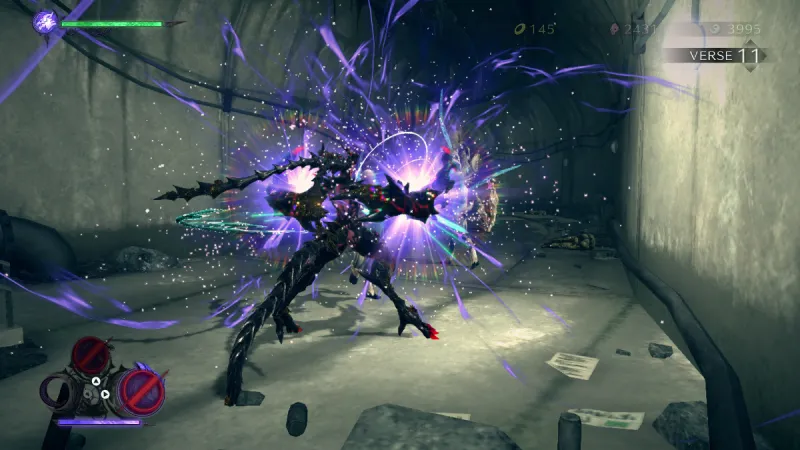
Demon Masquerade channels the power of the demons inhabiting Bayonetta’s weapons, altering her combat style and transformations. Madama Butterfly, for example, is tied to her pistols, lending her the combat attributes previously described. Gomorrah, Bayonetta’s dragon-like pet, embodies an oversized hammer called the G-Pillar. Using this weapon trades speed for power as G-Pillar can knock out foes with only a few deliberate swings. G-Pillar also acts as a firearm, unleashing powerful blasts from its handle-like gun barrel. Other demons include the giant spider Phantasmaraneae, whose disc-like weapon lets players fire webs that temporarily immobilize opponents. Expect many demonic arms, and since you can cycle between two weapon sets on the fly, players can concoct varied strings of offensive combo attacks.
Wink Slave offers another offensive twist. While unleashing a combo, timing a ZL button press with a telltale weapon glimmer ends your flurry with a powerful demonic strike. Masquerade Rage offers a more prolonged form of special attack. In Madama Butterfly’s case, Bayonetta can conjure her massive arms to deal devastating, wide-reaching melee attacks.
Demon Masquerade also serves as an evolution of Beast Within, the transformation mechanic from previous entries. Instead of morphing into a panther to run faster or a crow to fly higher, Bayonetta now assumes the form of the equipped demon, bestowing a range of useful abilities for combat and exploration. Turning into a smaller version of Madama Butterfly still allows Bayonetta to quickly cover ground as the panther did, but she hovers using her wings instead of running. Gomorrah’s power turns Bayonetta into a bestial version of herself, sporting giant claws and the ability to leap long distances. Phantasmaraneae allows Bayonetta to crawl up walls and cross gaps by swinging on a web line.
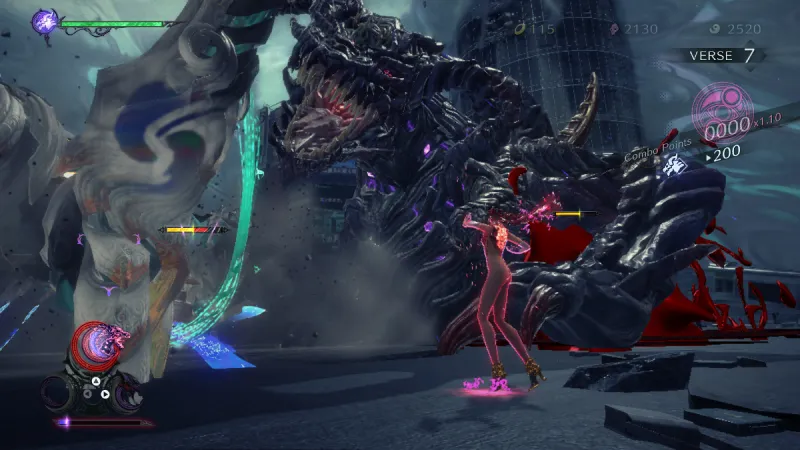
“Initially, there was some debate about how to carry Beast Within over to this game, and we thought doing the same thing wouldn’t show any improvement or evolution on Bayonetta’s part, so we decided to elevate it to the new Demon Masquerade system,” says Miyata.
The new Demon Slave feature takes Bayonetta’s reliance on her otherworldly minions even further. By holding the ZL button, players can summon and directly control an Infernal Demon during combat.
“Bayonetta has her ‘Climax Summon’ magic, but in the previous games, they were cinematic finishing moves,” explains Miyata. “They were visually impressive and gave the satisfying feeling of having finished off an enemy, but for this game, we felt that making those visually stunning finishing moves part of actual gameplay would add another level of fun and impact and got to work with that idea in mind.”
A Tamer Witch Trial
Demons pack a wallop, able to obliterate foes with only a few attacks. It’s even better when you trigger Witch Time to give your creatures a greater advantage. Demons can also stun enemies, opening up windows to finish them with a Torture Attack. Furthermore, each entity sports a special ability. Madama Butterfly blows kisses that charm enemies into fighting alongside you. Gomorrah bites targets, then tosses them airborne where you can follow up with an aerial attack. Demon Slave drains your magic meter, so you’ll have to make quick work of your adversaries before it expires. Bayonetta can’t move or attack while using Demon Slave but she can dodge, so you have to keep an eye on your surroundings to avoid taking cheap shots. Certain areas have special summoning circles granting unlimited magic use when activated, provided you are able to stay within its radius. Since this magic nullifies your dodge as well, taking advantage of it is easier said than done.
Another risk comes in the form of Demon Ram- page. When your demonic companion takes damage, it raises its anger gauge. Filling this meter causes Bayonetta to lose control of the summoning, unleashing the demon on a wild stampede where it indiscriminately attacks anyone and anything. Demons can also be killed in battle, rendering them unavailable for use for a temporary period.
With these factors in mind, I found the best tactic was strategically incorporating Demon Slave into Bayonetta’s standard combos. Executing long offensive strings and mixing in some Gomorrah chomps feels good, though the large size of these creatures means they occupy a lot of real estate on the screen. I needed to rotate the camera regularly to keep Bayonetta in view to avoid being hit off-screen while I steered the demon, so the mechanic does take getting used to.
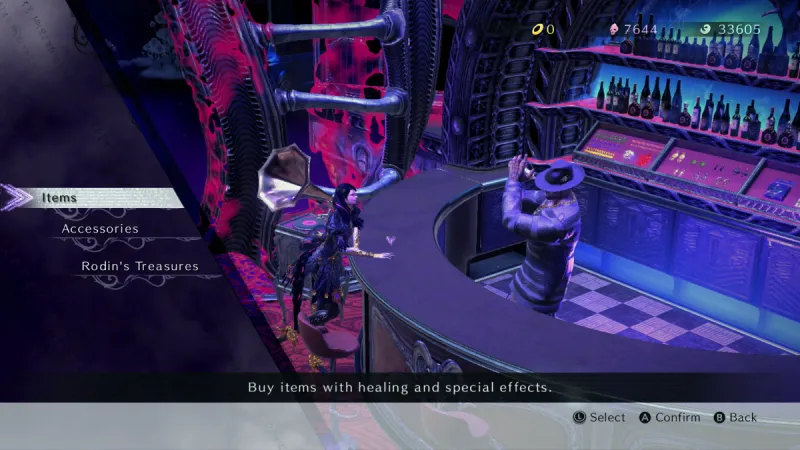
After finishing the last Homunculi, I collect the currency they drop, called Embryos. The green fragments replace Halos as the game’s primary form of money. Halos are still present, but they’re now a rare commodity obtained through special means. Platinum isn’t speaking on whether players will still battle angels and demons in Bayonetta 3, but the game establishes that angels appear few and far between these days, making me wonder how the multiversal crisis has affected the heavenly plane of Paradiso. Embryos and Halos are spent at the Gates of Hell. Platinum won’t reveal the rewards tied to Halos, but Embryos unlock consumables, accessories, and upgrade items.
In a convenient shift for the series, Bayonetta 3 features traditional skill trees. Gone are the days when players had to lug Halos around until they found a portal to Rodin’s bar; skill trees are accessible through the menu, meaning you can upgrade Bayonetta whenever you want. Spending Orbs, another new collectible earned during the post-combat encounter report card, unlocks new moves. Demons have their own ability trees too, expanding their capabilities for Demon Masquerade/Slave and creating a plethora of potential combat combinations.
“Compared to the previous games, this game hosts a far greater number of skills,” says Miyata. “In addition to skills linked to Bayonetta’s weapons, each Infernal Demon has its own unique skills, and just adding those up gives you more than ten times the number of skills compared to the previous games.”
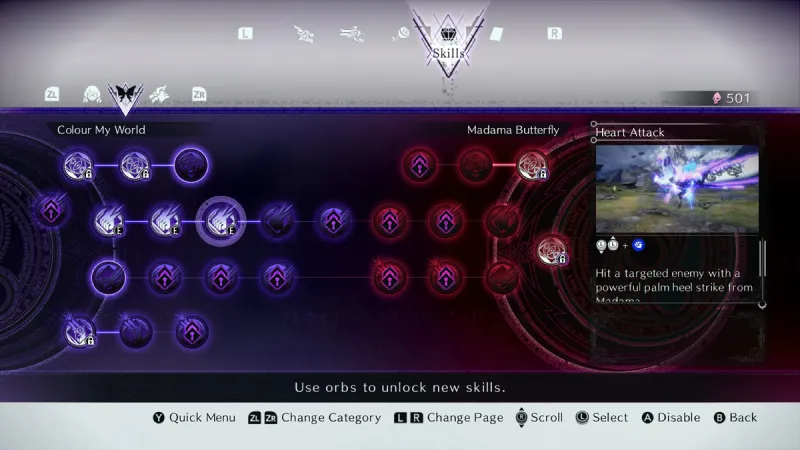
With so many options at your disposal, the skill tree allows you to equip as many moves as you wish. You can also unassign abilities. This essentially allows you to make Bayonetta’s moveset as robust or as simplified as you see fit.
Platinum wants to ease players into Bayonetta’s intricacies better. For example, Torture Attacks won’t be available from the start, unlocking as you play. Don’t worry, veterans; you’ll be tossing enemies into iron maidens sooner than you think. But Platinum wants to ensure newcomers or rusty players aren’t overwhelmed by Bayonetta’s numerous talents from the get-go.
Bayonetta 3’s revamped level design provides another avenue to show off your demon-summoning prowess. The larger levels pack even more secrets, many of which are only discovered with the help of your demons.
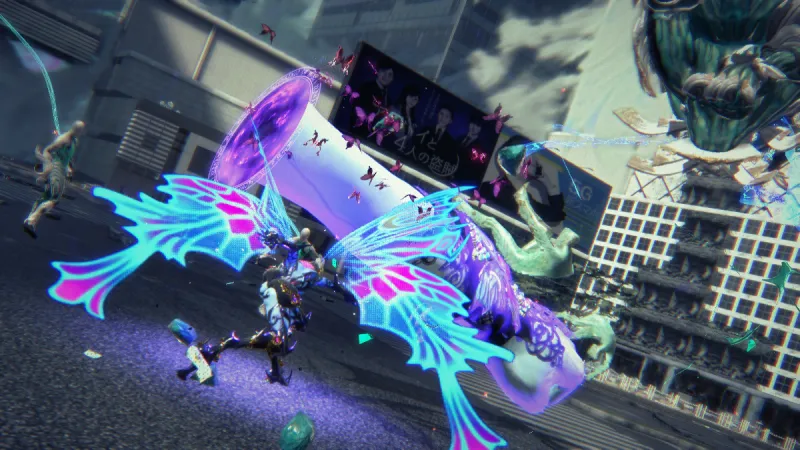
“There are places that Infernal Demons can be used to destroy things and solve puzzles scattered throughout the stages,” says Miyata. “We’ve also created areas that can be conquered using the unique methods of traversal afforded by Demon Masquerade abilities, adding a degree of satisfaction to exploration.”
Miyata wants to keep the new exploration features a secret, but did discuss Familiars. Fans likely remember sneaking up on crows to get precious Umbran Tears in past games. This challenge returns, but now cats and frogs carry them too. Familiars run and/or hide in their own unique ways unless approached correctly and collecting every Umbran Tear in a stage unlocks a secret level. Miyata described this unlockable stage as some sort of challenge divorced from the narrative, though it will feature some familiar faces. Clearing the area bestows a mysterious special item.
If you get sidetracked searching for goodies, clicking the left analog stick toggles a waypoint reorienting you towards the critical path. A destructive fog called Eraser also surrounds the borders of each level. Narratively, this wispy barrier eats away at reality, illustrating the multiverse’s instability. Functionally, it’s a fancy version of invisible walls designed to keep players out of inaccessible zones; touching the Eraser damages Bayonetta.
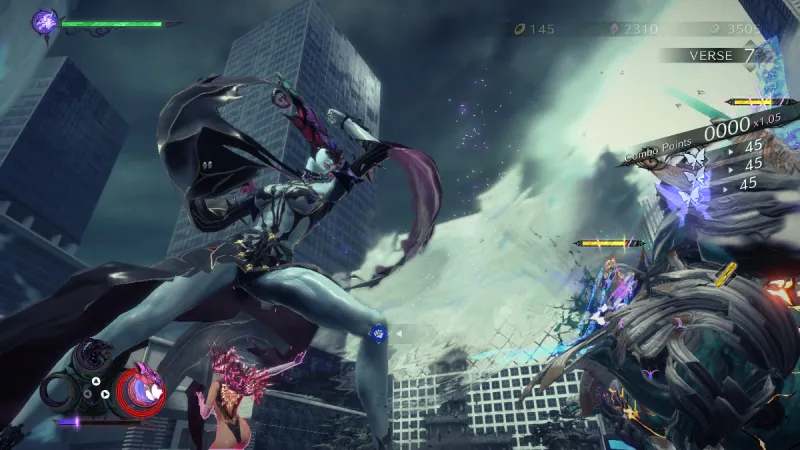
I exit Ginnungagap and enter a brand-new universe. I’m deposited into a train car arriving at Tokyo’s Shinagawa Station. Homunculi have hijacked this train, and I discover I’m unable to activate Demon Slave in smaller spaces. I dish out punishment the old-fashioned way, but it’s not long before my battle literally goes off the rails as the car topples off the track and into the city below. Bayonetta effortlessly leaps away and summons Gomorrah to catch her. As we land on a rooftop, Gomorrah, in his full glory, is under my total command as I square off with an equally massive Homunculi.
The fight unfolds like a classic Godzilla showdown. I mash attack buttons to methodically bash my foe. In addition to throwing my scaly hands, I can also unleash fireballs. Though it’s always cool to see giant monsters beating the snot out of each other, the action feels more lethargic than I would like. Thankfully, the foundation of our rooftop arena gives way, and I’m surfing down lanes atop my demon buddy as the district collapses all around me. This serves as a chaotic sliding segment as Bayonetta rides Gomorrah, dodging flying debris and taking bites out of enemies foolish enough to attempt to derail us. In a funny sequence, we plunge into a river and emerge with boats attached to the soles of Gomorrah’s feet, acting as oversized skates. As Bayonetta safely lands in another area of Tokyo, my destructive romp through the city comes to an end as this part of the demo concludes.
Bayonetta or young Cereza?
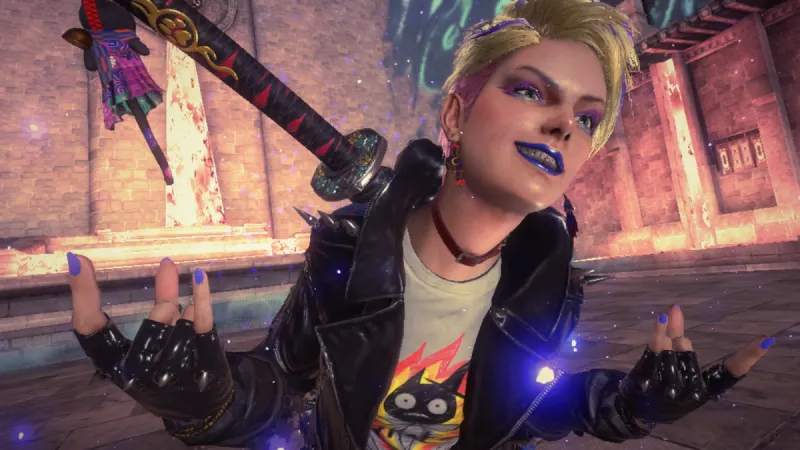
The Punky Upstart
The Punky Upstart
The demo jumps ahead several missions to a mountainous region of China, unfolding within the gape of a mountain volcano. It’s here where players take control of Viola for the first time. Her task: retrieve Luka, Bayonetta’s ally and womanizing journalist extraordinaire. For some reason, Luka appears out of sorts, obliviously bumbling his way across the magma-filled chasms as Viola clumsily gives chase.
Viola isn’t a full-fledged Umbra Witch, a fact her personality makes abundantly clear. She’s vulgar, hot-headed, and aggressively punk rock. For example, she shatters combat barriers by throwing up devil horns instead of blowing cheeky kisses. That overwhelming ‘tude may scare some fans into thinking she’s Platinum’s version of The Simpson’s infamous Poochie, but she’s softened by also being clumsy, uncertain, and scatterbrained.
I get the sense that Viola’s not always as cool as she may want to be. At one point, a pile of cannon balls becomes loose as the area gradually falls apart. Luka hops atop one of them to roll downhill. Viola, wanting to keep up and seeing no other option, awkwardly follows suit, leading to a humorous chase sequence as she struggles with maintaining her balance while dodging incoming debris. In short, Viola is a far cry from possessing the confident elegance that defines Bayonetta, and that’s by design.
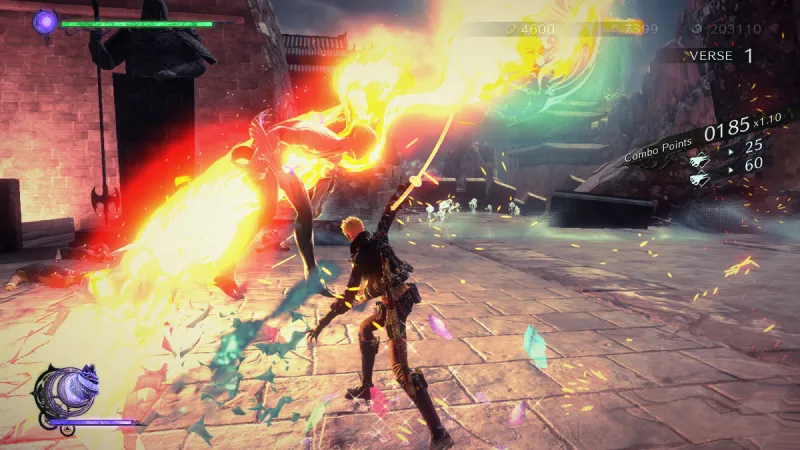
“Bayonetta is depicted as a perfect witch who possesses both strength and beauty, but when constructing a game or story, if you only have a perfect person, then there’s no one to compare them to, and we thought the experience would become monotonous,” explains Miyata. “By introducing the comparatively immature and imperfect Viola as another player in the story, we feel we were able to emphasize just how amazing Bayonetta is that much more, adding depth to the story.”
That doesn’t mean Viola only exists to reinforce Bayonetta’s greatness. She plays a central role in the plot, serving as the catalyst for the game’s events. As to what that means exactly, Platinum wants players to find out for themselves.
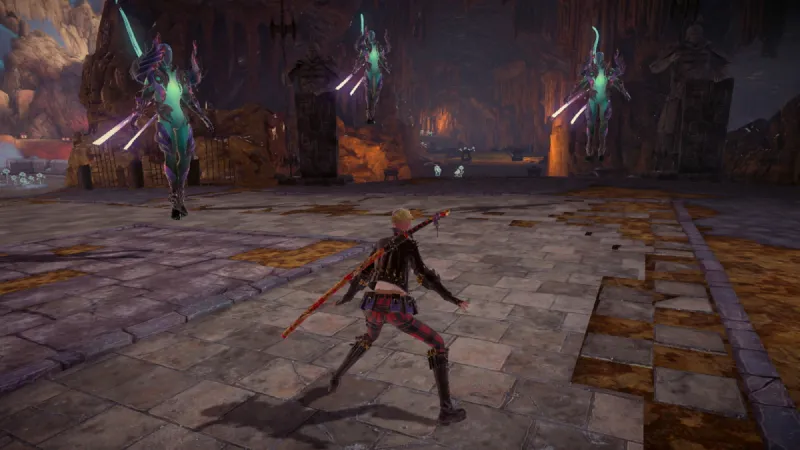
Viola sports a vastly different playstyle that reflects her inexperience. Instead of being adept at using a variety of weapons like Bayonetta, Viola only uses her katana and throwing darts. She also summons Cheshire for backup. What she lacks in finesse, though, she makes up for with raw power.
Playing as Viola, her style feels noticeably more deliberate. She’s still quick, but her sword attacks feel more measured and, most of all, impactful. This approach tells me that Viola may not have the experience to hang in a drawn-out battle, so she focuses on hitting haymakers to quickly end encounters. Case in point: Holding the attack buttons charges her swings, engulfing her in a fiery aura that unleashes an explosive assault on the unlucky target.
Viola lacks her own set of guns – those are reserved for true Umbra Witches. Instead, she uses an unlimited supply of throwing darts to keep distant foes at bay. Naturally, you can’t fire these off as quickly as bullets, so you have to be more tactical about when to toss them.
About that First Trailer…
Like Bayonetta, Viola summons her demon companion Cheshire to fight alongside her. She accomplishes this by using the doll attached to her sword as the conduit for the summoning instead of her hair. The trade-off is that she has to disarm herself, something Miyata says requires a great degree of courage since she relies on her sword so heavily.
Viola’s rookie status means she’s less capable at using magic; she can conjure demons but can’t control them. Thus, Cheshire behaves independently, swiping his large paws and going ballistic on whatever threat lies in front of him. As the Avengers learned when dealing with the Hulk, the best way to “control” Cheshire’s onslaught is to point him towards a target and hope for the best. It’s amusing watching this ridiculous-looking creature go to town on enemies. Plus, the benefit of not having to command Cheshire is that players can still fully control Viola. Although she has to fight bare-handed, tearing apart Homunculi alongside her demonic kitty is a blast, and Platinum says the pair are capable of dishing out more max damage than even Bayonetta.
Witch Time presents the biggest contrast between Viola and Bayonetta, one that will throw veteran players for a loop. Going back to Viola’s emphasis on brute strength, she doesn’t dodge to trigger the effect. Rather, you must block with your sword just before an attack lands. What will trip up fans – as it did me – is that blocking is mapped to the R button. Years of using Witch Time has trained me to keep a finger hovering over the right trigger at all times, so I absorbed many punches to the face before I became (mostly) used to hitting the R button instead. Viola can still dodge, mind you; it just doesn’t have an effect tied to it. The upside is that the timing window for Witch Time is more forgiving in Viola’s case. If that doesn’t work out, she can simply block attacks normally.
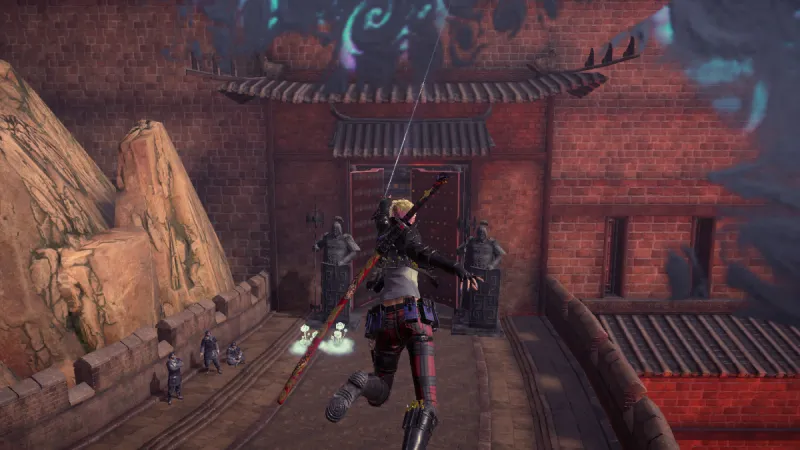
These traits, plus Viola’s inability to use her hair to perform wicked weave attacks, initially made her feel basic in comparison to the flashier Bayonetta. But the more I played with her, the more I began to understand and appreciate the differences she brings to the table. Most exciting is that I only played the weakest version of Viola. Like Bayonetta, she sports a full skill tree, and I’m excited to see how her arsenal evolves throughout the adventure.
Though my time with Bayonetta 3 was relatively brief, I walked away impressed with the number of exciting and smart features Platinum has implemented. I have mild reservations about controlling Demon Slave during titanic monster smackdowns, but overall, it feels like a fun addition to an already winning formula. Viola brings a new brand of entertainment to the fray, exploration appears more involved in a good way, and the skill tree adds depth, flexibility, and convenience.
“For Bayonetta 3, we pulled out all the stops and jam-packed it full of everything we ever dreamed of,” says Nakao. “…I think our fans will enjoy the game in a way that shatters their expectations – in a good way, of course!”
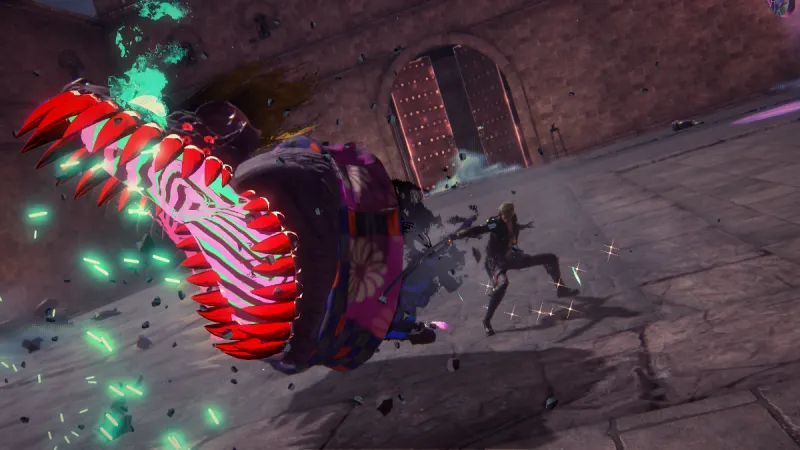
One of my biggest takeaways is that the game performs well on Switch. That shouldn’t be a total surprise; the Switch ports of Bayonetta 1 and 2, though they are, admittedly, older titles, run at 60 frames-per-second, making them a blast to play on the go. Though I only played Bayonetta 3 while docked, the fact that Platinum has already worked with the hardware for years gives me confidence the experience will hold up. We’ll see if that rings true, but I’m less wary than I was before the demo.
Most comforting is that this new entry, despite these big changes, still feels like a Bayonetta game. The tongue-in-cheek humor and innuendo, absurdly bonkers spectacle, and Bayonetta’s alluring personality remain intact. After so many years of waiting (even before Bayonetta 3 was officially announced), it feels great to hang out with the classiest witch in video games for another stylish romp. And with the intriguing Viola tagging along, the more the merrier. Hopefully, Bayonetta 3 is more than worth the wait when it arrives at the end of this month.
This article originally appeared in Issue 350 of Game Informer.
Stay connected with us on social media platform for instant update click here to join our Twitter, & Facebook
We are now on Telegram. Click here to join our channel (@TechiUpdate) and stay updated with the latest Technology headlines.
For all the latest Gaming News Click Here
